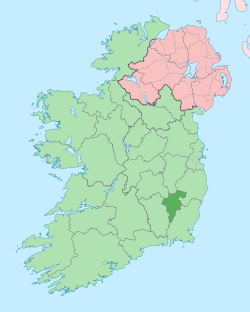Muine Bheag
Muine Bheag[2] or Muinebheag [ˈmˠɪnʲə vʲɔɡ], also known in English as Bagenalstown /ˈbæɡ.nəlz.taʊn/, is a small town on the River Barrow in County Carlow, Ireland.
Muine Bheag Bagenalstown | |
|---|---|
Town | |
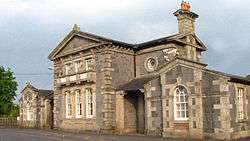 The railway station | |
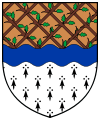 Coat of arms | |
| Motto(s): Uimhir gan choisc "The Irrepressible Number" | |
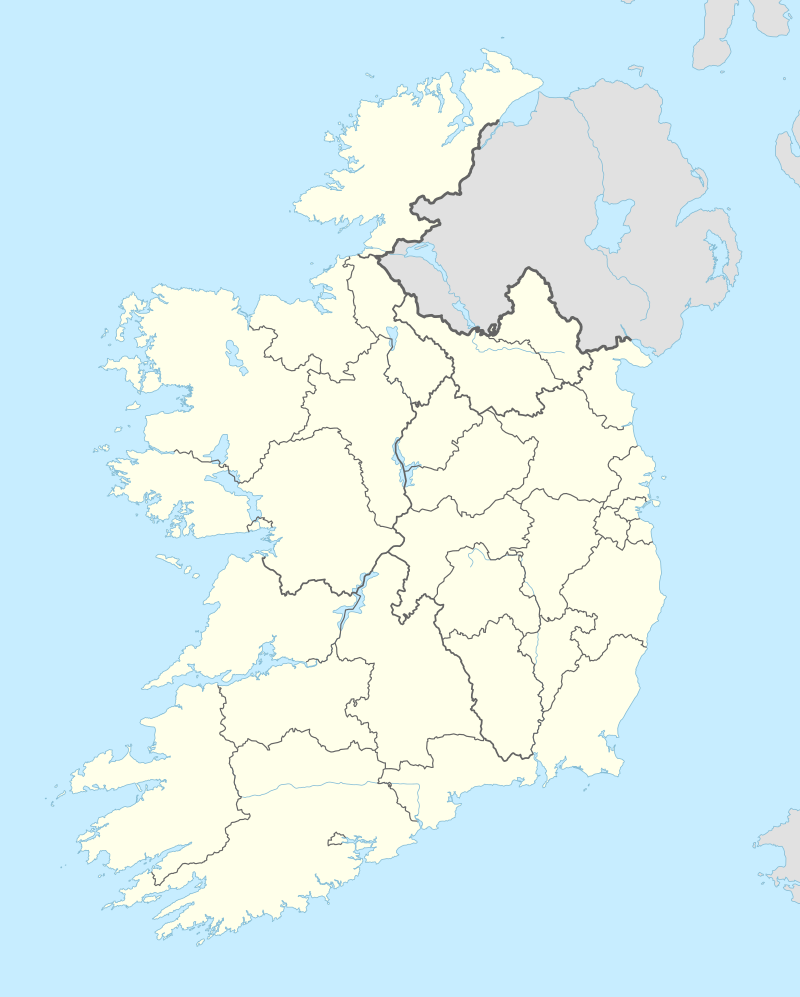 Muine Bheag Location in Ireland | |
| Coordinates: 52.701°N 6.957°W | |
| Country | Ireland |
| Province | Leinster |
| County | County Carlow |
| Elevation | 40 m (130 ft) |
| Population (2016)[1] | 2,837 |
| Time zone | UTC±0 (WET) |
| • Summer (DST) | UTC+1 (IST) |
| Eircode routing key | R21 |
| Telephone area code | +353(0)59 |
| Irish Grid Reference | S683609 |
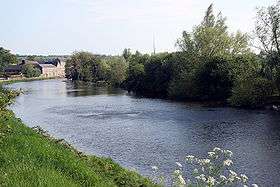
History and name
The town sprang up within the townland of Moneybeg, or Muine Bheag in Irish (meaning "small thicket").[3] In the 18th century there was a small hamlet there. Walter Bagenal decided to build a town on the site, named "New Versailles" and modelled after Versailles in France.[4] However, shortly after the building began the coach route from Dublin was changed so that coaches now crossed the River Barrow at Leighlinbridge instead.[4] Bagenal abandoned his plans, having built only a courthouse.[4] It wasn't until the arrival of the railway in 1846 that the settlement began to grow into a town.[4]
In 1911 the town became the first in Ireland to install dual language street signs, which remain in place today.[5] In the aftermath of Ireland's independence in 1920, the town commissioners chose to drop the English name "Bagenalstown" in favour of the Irish Muine Bheag. The decision proved an ineffective one, and "Bagenalstown" remains in common use among locals. In a 1975 plebiscite 77% of residents polled voted to change the name back, but the proposal failed due to insufficient voter turnout.[5]
The motto on the town's coat of arms is "The Irrepressible Number" and its Irish equivalent Uimhir Gan Choisc.
Places of interest
Near Muine Bheag is Ballyloughan Castle, which comprises a twin-towered gatehouse and the hall and foundations of one of the corner towers of a large castle dating from about 1300.[6]
Ballymoon Castle is 3 km (2 mi) east of Muine Bheag, and is thought to date from the 13th century.[7]
Community groups
The 1st Bagenalstown BP Scout Group was set up in 2009 and meets in the McGrath hall. Their activities include hiking, camping, kayaking and games.[8]
Muine Bheag hosts a floral festival every August.
Sport
Muine Bheag is the local GAA club, formed in 2018 after the amalgamation of three former clubs.
Muine Bheag has had a long tradition in cricket. The Bagenalstown Cricket Club was first formed in 1843 by the local millers, and is still in use. The club's logo is a grinding wheel, which was used in early milling.
There is a swimming pool on the approach road to the town from Leighlinbridge.
The racehorse Danoli, described in 1995 as "the most popular racehorse in Ireland"[9] was trained near the town by Thomas Foley.
Education
Muine Bheag has three primary schools and two secondary schools.
- Queen of the Universe National School, founded by Bishop Keogh in 1957, is a primary school in Muine Bheag for boys (junior infants to 1st class) and girls.
- St Brigid's National School, founded in 1865, is a primary school in Muine Bheag for boys only from classes 2nd to 6th.
- St Mary's National School is a co-educational school under Church of Ireland patronage, based in Muine Bheag.
- Presentation De La Salle College is a secondary school in Muine Bheag established in 1983. This Catholic College is under the trusteeship of the De La Salle Brothers, the Presentation Sisters and Bagenalstown Parish.
- Muine Bheag Vocational School is a secondary school in Muine Bheag, opened in 1963.
Transport
The town is on the River Barrow. It is at the junction of the R705 and R724 regional roads and lies on the eastern side of the R448.
It is connected to the railway network on the Dublin – Kilkenny section of the Dublin-Waterford railway line. This connects the town to nearby Carlow, as well as Kilkenny to the southwest. Muine Bheag railway station opened on 24 July 1848. It was permanently closed for goods traffic on 6 September 1976[10] and renamed "Muine Bheag" in 1988.
International relations
The town was twinned with the town of Pont-Péan, Brittany in 1999. The twinning charter, which is written in Irish, English and French, commits the two towns to "developing social, economic, cultural, touristic, and sporting links" between the two communities.
Notable people
- Seán Drea, World Rowing Championship silver medalist, Olympian and world record-breaking sculler
- John Lucas, soldier who won a Victoria Cross during the Taranaki Maori War in New Zealand in 1861
- Richie Kavanagh, entertainer
- Beauchamp Bagenal (1741–1802), rake, duellist and reputedly "the handsomest man in Europe"[11]
References
- "Sapmap Area - Settlements - Muinebeag (Bagenalstown)". Census 2016. Central Statistics Office Ireland. April 2016. Retrieved 26 December 2019.
- "Muine Bheag". Placenames Database of Ireland. Retrieved 18 April 2014.
- "Why rail is the way to go | Munster Express Online". Munster-express.ie. 14 March 2008. Retrieved 21 July 2012.
- Mayse, Shirley. Our Caswell Relatives. University of Wisconsin, 1975. p.343
- "Carloviana" (PDF). Carlow Historical and Archaeological Society. 2004. p. 10.
- "Ballyloughan Castle". Carlow Tourism – Castles. Archived from the original on 11 March 2005. Retrieved 9 December 2007.
- "Ballymoon Castle, County Carlow". Irelands Eye.com. Retrieved 10 December 2007.
- http://www.bagenalstownparish.ie/2011/03/tuesday-march-29-2011/
- Mallon, Brian (11 April 1995). "Danoli's career still in balance after operation". The Independent. Retrieved 21 July 2012.
- "Bagenalstown station" (PDF). Railscot – Irish Railways. Retrieved 11 October 2008.
- Donaldson, William Rogues, Villains and Eccentrics: An A-Z of Roguish Britons Through the Ages pp 38–9, Phoenix, London, 2002
External links
| Wikivoyage has a travel guide for Bagenalstown. |
| Wikimedia Commons has media related to Muine Bheag. |
